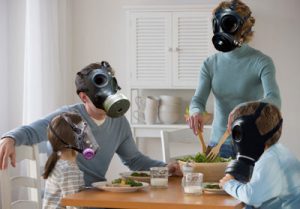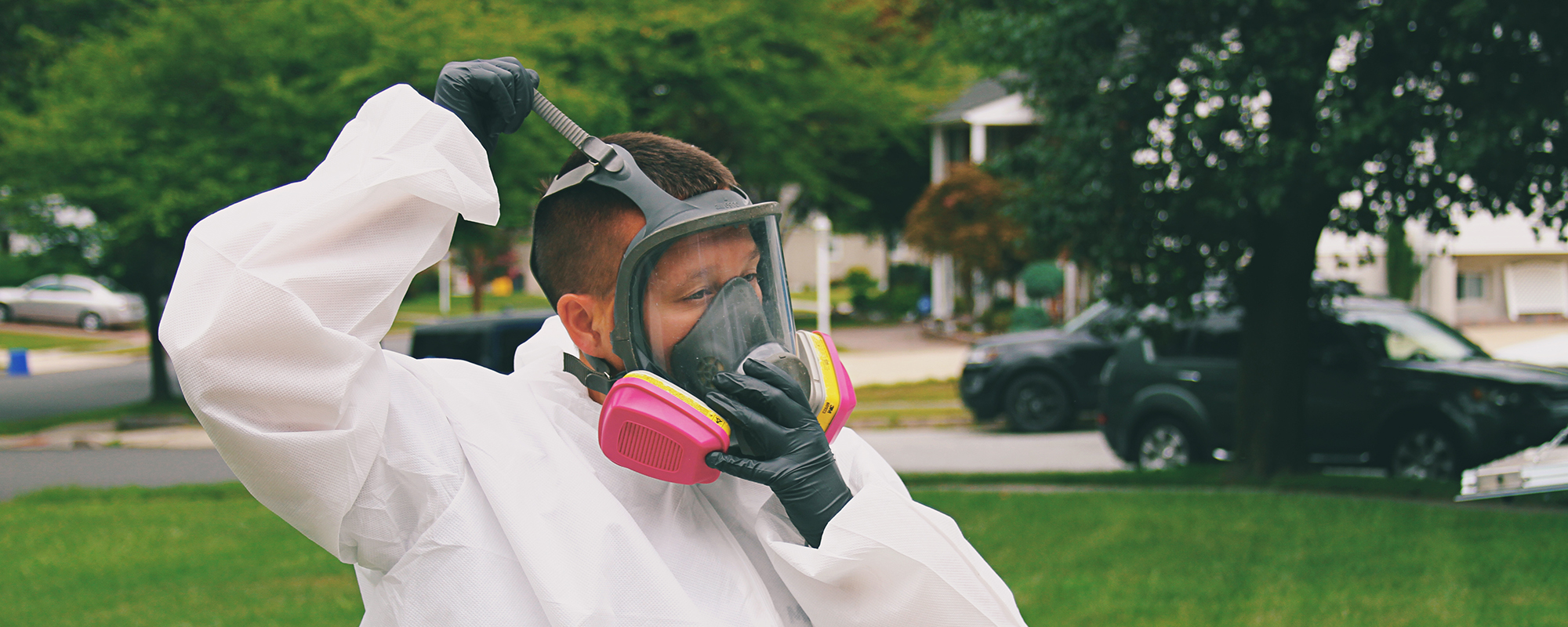Indoor Air Quality Affects Everyone
Indoor air quality may not be something that everyone keeps in the front of their minds when it comes to home maintenance. Understandably, it can easily be overlooked. You want your home to be safe, clean, and comfortable for you and your family, right down to the very air that you breathe. We want South Jersey homeowners to understand the importance of improving the air quality within their homes. There is a wide variety of indoor air pollutants that could be present. It is recommended to minimize these pollutants as much as possible.
Pollutants That Could Be Affecting The Quality Of Your Home’s Air
Indoor air pollution is one of the largest environmental health risks, because it affects the air we breathe. It is important to take note of what could be affecting the air quality in your home and how to minimize it. Every home has a variety of potential indoor air pollutants, some more inconspicuous than others. Potential pollutants within your home contain an elevated level of volatile organic compounds, or VOCs. When VOCs penetrate the atmosphere of your home, they react with other compounds found in the air. This creates particulate matter, which can cause potential health implications in people with sensitivities. Possible health implications caused by particulate matter include sneezing, itching eyes, and respiratory trouble among other things. Keep in mind that everyone is different, and some people may display symptoms while others may not react at all.
Some household items that may put off VOCs include:
Cleaning Supplies & Fragrances: The chemicals found in cleaning supplies and many scented products such as perfumes can give off VOCs that cause particulate matter within the home. Using more natural products in your home can minimize the amount of VOCs given off.
Smoke: Smoke from cooking, fireplaces, cigarettes, and even candles can give off VOCs. Ensure that this smoke has a way to escape the home, such as a vent fan or an open window.
Mold: Elevated moisture levels within a home can cause potential for fungal growth to develop. Humidity, condensation, or even moisture from a leak or flood can build up in porous building materials, leading to mold development. Mold is opportunistic, so it can form in almost any environment so long as there is a moisture source present. There could be many indicators of mold in your South Jersey home. You have to know what you’re looking for. Mold can appear in a variety of colors, including black, white, brown, grey and green. Be aware of any suspicious odors, or staining on walls, ceilings or floors. If you are concerned about a potential mold issue within your home, call a professional mold inspection company in your area to assess the situation.
Methods Of Minimizing Air Pollutants
One of the best ways to minimize indoor air pollution in your home and improve air quality is to employ the use of proper ventilation. Keeping fresh air circulating throughout the home is a great way to make sure that particulate matter doesn’t become stagnant within your home. You should have a vent fan or an open window when showering, cooking, or running the dishwasher. Not only do these activities give off moisture, but also VOCs from detergents or potential smoke.

Avoid smoking inside. This may seem like common sense, as we all know the dangers of smoking. Ideally, you could attempt to quit smoking altogether. Smoking does not just negatively effect your body. If you are smoking indoors, it can have negative effects on your home as well. The same way smoking causes yellowing of the teeth, eyes, and even skin, the same thing can happen to the contents of your home. The VOCs given off by a cigarette can be potentially harmful to not only the one smoking, but those around them as well.
If you or your family are experiencing mild symptoms such as sneezing, irritated eyes, and trouble breathing, you may want to look into air purifiers. Air purifiers will help to not only circulate the air, but also draw pollutants out of the air to make it safer for you and your family. Ensure that the air purifier you choose has an adequate filter, and make sure you are changing this filter regularly. Dehumidifiers can also be a huge help when it comes to improving indoor air quality. A dehumidifier will help to reduce moisture levels, minimizing the potential for mold development.
Effects of Humidity Levels on Air Quality
Maintaining optimal humidity levels is crucial for indoor air quality because both high and low humidity can have negative impacts on your home environment. High humidity levels create an ideal breeding ground for mold, dust mites, and other allergens, while low humidity can cause discomfort and health issues such as dry skin and respiratory problems.
Preventing Mold Growth
High humidity levels, particularly above 60%, can lead to mold growth, which can occur within 24 to 48 hours under the right conditions. Mold spores are ubiquitous in the environment and only need moisture, warmth, and organic material to thrive. According to the Environmental Protection Agency (EPA), keeping indoor humidity levels between 30% and 50% is optimal for preventing mold growth. This range helps to inhibit the proliferation of mold spores, which can cause structural damage to your home and pose significant health risks.
Reducing Dust Mites
Dust mites are microscopic pests that thrive in humid environments, particularly when humidity levels are above 50%. These pests feed on dead skin cells and other organic matter found in household dust. Dust mite droppings and body fragments are common indoor allergens that can exacerbate asthma and allergic reactions. By maintaining humidity levels within the 30% to 50% range, you can significantly reduce dust mite populations and improve indoor air quality.
Health Implications
Exposure to mold can cause a variety of health issues, especially for individuals with allergies, asthma, or compromised immune systems. Symptoms of mold exposure include nasal congestion, throat irritation, coughing, wheezing, eye irritation, and skin rashes. In severe cases, mold exposure can lead to respiratory infections. According to the CDC, people with chronic respiratory conditions may experience worsened symptoms when exposed to mold.
Using Dehumidifiers
Dehumidifiers can be an effective tool in maintaining appropriate indoor humidity levels. These devices work by extracting excess moisture from the air, thereby reducing the likelihood of mold growth and dust mite proliferation. Regularly using a dehumidifier, especially in areas prone to high humidity such as basements and bathrooms, can help maintain a healthy indoor environment.
The Role of Ventilation Systems
Proper ventilation is essential for maintaining good indoor air quality by reducing the concentration of indoor pollutants. Effective ventilation helps to dilute and remove contaminants, ensuring a steady supply of fresh air.
Exhaust Fans in Kitchens and Bathrooms
Kitchens and bathrooms are two areas of the home where ventilation is particularly important due to the high levels of moisture and pollutants generated. In the kitchen, cooking can release smoke, grease, and odors, while in the bathroom, showers and baths produce significant amounts of steam. Using exhaust fans in these areas helps to expel excess moisture and pollutants, preventing mold growth and reducing the accumulation of volatile organic compounds (VOCs). The National Center for Healthy Housing (NCHH) emphasizes that proper ventilation in these key areas is crucial for reducing indoor air pollutants and improving respiratory health.
Improving Respiratory Health
Proper ventilation is not only about removing moisture and odors but also about ensuring that harmful pollutants like VOCs, carbon monoxide, and radon are kept at safe levels. According to the NCHH, inadequate ventilation can lead to a buildup of these pollutants, which can cause respiratory issues, headaches, dizziness, and other health problems. Ensuring that your home has adequate ventilation systems, including operable windows and mechanical ventilation, can significantly improve indoor air quality and overall health.
Natural Ventilation
In addition to mechanical ventilation systems, natural ventilation can also play a role in improving indoor air quality. Opening windows and doors to create cross-ventilation can help flush out indoor pollutants and bring in fresh air. This method is particularly effective in areas with low outdoor pollution levels and during mild weather conditions.
By maintaining optimal humidity levels and ensuring proper ventilation, homeowners in South Jersey can create a healthier living environment, reducing the risk of mold growth and improving respiratory health. Regular maintenance of these systems and the use of dehumidifiers can further enhance indoor air quality, providing a safer and more comfortable home for you and your family.
Ensuring that your family is breathing clean air is more important now than ever. Keeping your home clean, safe and comfortable doesn’t have to be a huge chore. The steps you take to improve your home’s air quality may seem subtle. In the long run they can make a huge impact.
Call 609-948-8844 for help improving your indoor air quality to create a healthier home environment
Indoor Air Quality FAQ
Q: How often should I change my HVAC filter to maintain good air quality? A: It’s recommended to change HVAC filters every 1-3 months, depending on the type of filter and the level of use.
Q: Can indoor plants really improve air quality? A: Yes, certain indoor plants can help filter out toxins and improve air quality, though they should be used as a complement to other air quality improvement methods.
Q: Are air purifiers effective at reducing indoor pollutants? A: Yes, air purifiers with HEPA filters are effective at capturing particles like dust, pollen, and pet dander, improving overall air quality.
Q: What are VOCs and why are they harmful? A: Volatile Organic Compounds (VOCs) are chemicals that can evaporate into the air and cause health problems. They are found in many household products and can contribute to poor indoor air quality.



